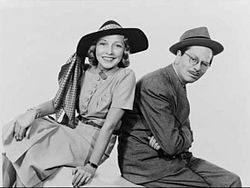Easy Aces

Goodman and Jane Ace-Easy Aces (1939)
|
|
| Genre | Comedy |
|---|---|
| Running time | 15 minutes (KMBC) 30 minutes (CBS) |
| Country | USA |
| Language(s) | English |
| Home station |
NBC (Blue) CBS |
| Starring | Mary Hunter Paul Stewart Martin Gabel Helene Dumas Ken Roberts Ann Thomas Ethel Blume Alfred Ryder Peggy Allenby |
| Announcer | Truman Bradley Ford Bond |
| Written by | Goodman Ace |
| Air dates | 1930 to 1945 |
| Opening theme | Manhattan Serenade |
Easy Aces, a long-running American serial radio comedy (1930–1945), was trademarked by the low-keyed drollery of creator and writer Goodman Ace and his wife, Jane, as an urbane, put-upon realtor and his malaprop-prone wife. A 15-minute program, airing as often as five times a week, Easy Aces wasn't quite the ratings smash that such concurrent 15-minute serial comedies as Amos 'n' Andy, The Goldbergs, Lum and Abner, or Vic and Sade were. But its unobtrusive, conversational, and clever style, and the cheerful absurdism of its storylines, built a loyal enough audience of listeners and critics alike to keep it on the air for 15 years.
Goodman Ace (b. Goodman Aiskowitz, 1899–1982) was a film critic for the Journal Post in his native Kansas City. On radio station KMBC, he read comic strips to children on Sunday mornings and reviewed films on Friday evenings. One night in 1930, the cast of the 15-minute show that followed his slot failed to show up, and Ace found himself having to fill in the time. His wife, Jane (b. Jane Epstein, 1897–1974), had accompanied him to the studio that night, and the two engaged in an impromptu chat about their weekend bridge game. This brought such a favorable response that the station invited Ace to create a domestic comedy---even though neither of the couple had ever really acted before.
At first, according to radio historian John Dunning (in On the Air: The Encyclopedia of Old-Time Radio), the show oriented entirely around the couple's bridge playing, and nearly died the same way, when Jane Ace was said to have lost her temper over her husband's constant needling of her style of play, and threatened to quit the show entirely. Ace revamped the show into "a more universally based domestic comedy revolving around Jane's improbable situations and impossible turns of phrase." The result was one of radio's most respected comedies, going on to a fifteen-year air life despite its never being a ratings blockbuster. It was the first KMBC program to go on to become a network radio show.
...
Wikipedia
